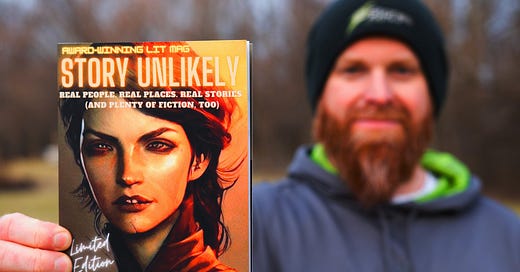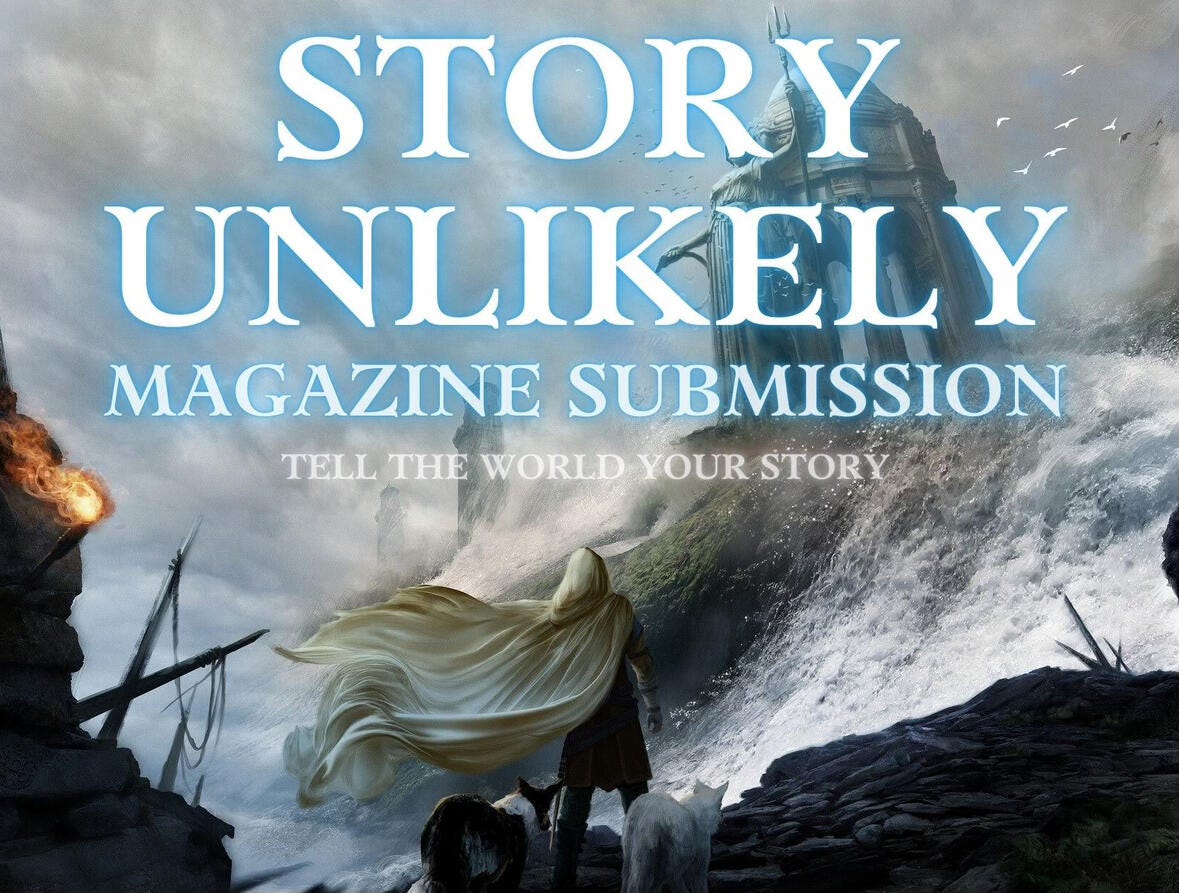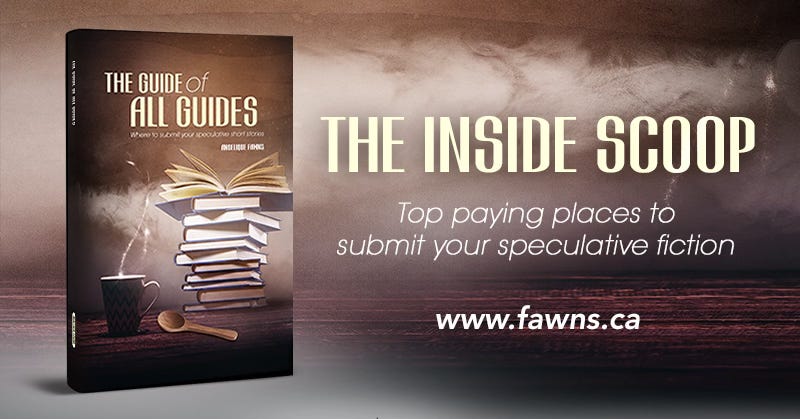Story Unlikely
Anything- deadline Sept 29 - 8c a word up to $400 - 2c a word for reprints -3500 word max - any genre - All stories get professional art
Take a look at his submission guidelines, he wants the first 250 words in the body of the email. Learn more here
Now for our chat with Danny:
Story Unlikely is open for submissions now, and the editor is a colorful and sometimes controversial character in our writing world. Whatever your opinion, Danny Hankner is not boring. And neither is his press. Here is a quote from the website:
“Well, we did, and it’s working. We’re only three years in, and (to my knowledge) we’ve become the fastest-growing literary magazine in the English-speaking world, with new subscribers pouring in every day from over a hundred countries. And the best part - we did it all without social media. Let that accomplishment – and its implications – sink in.”
I’ve been communicating with Danny since he opened the “literal” doors of his magazine, and find him to be generous with his time, willing to promote others, and not afraid to say or do the odd, shocking thing. I don’t agree with all his viewpoints, but I certainly respect his right to voice them.
AF: You have a strong personality, brave viewpoints, and aren’t afraid to voice your opinion. Has that gotten you in trouble? Give us a window into who “Danny” is.
DH: Trouble? Me? Noooo. It’s like what Mark Wahlberg’s character said in The Other Guys, “I’m a peacock, let me fly!” In reality, our world is dying for authenticity. Everything is fake, and it only gets worse the more we delve into this strange internet age.
I think what separates me from so many in this industry is that I cut my teeth as a tradesman – twenty years after signing my life over to the construction overlords, I’m a licensed master electrician who has been running his own company now for 12 years. The thing I love about tradesmen is that they are the working definition of authentic. And they have to be! There’s no room for dancing around people’s feelings when your mistakes could get you, or the cat next to you, killed. Got a problem? Air it! Resolve it! Move on! Now, I’m not advocating being a jerk, but there’s a time and a place for everything, like the painful process called change that our world has all but left behind in some mad dash toward collective ‘safety’. The great irony is that it’s absolutely killing us. And when you leave this necessary process of examination and correction in the dust of our own inflated ego, what do we expect to be the results? Crappy movies and stale shows that nobody wants to watch, and a literary industry hemorrhaging money and readers and the industry heads can’t figure out why.
I’ll let you in on a little secret I call Danny’s Painful but Obvious Truth: Greatness always engenders an audience. You want to get read? Then get better. And get to work. Good anything ain’t easy, and writing is no exception.
Now, I vomit all of that on you to return to the question at hand: do I ever get in trouble? Of course! I’m an entrepreneur, a risk-taker, an agent of change. Try operating under those identities and not get in trouble. It’s like what I heard an editor once remark: if you’re not offending anybody, it’s because you’re not saying anything. Nobody likes to have their paradigms threatened, let alone shattered. Nobody likes to be told that their writing or (more importantly) their attitude - or even their narrow, self-centered worldview - is the problem. And because these fine folks have spent their entire lives winning collecting participation trophies and having their egos stroked in echo chambers, a minor correction or even – God help us! – a difference of opinion, breaks their mental Richter scale.
Inevitably, you run across rigid, inflexible people unwilling to consider anything beyond what they know and believe. And when these types storm off, I think to myself, the filters are working nicely.
AF: Why did you create Story Unlikely? Is there a Genesis story or specific event that motivated its inception?
DH: I started writing as a teenager in the afterburn of high school shenanigans, but even at a young age, I could feel my youth slipping away, and thought that these idiot friends of mine and the pranks we pulled were worth preserving, so I did just that, which led to fiction, and a few trite novels, and a smattering of published works here and there. But I always found it depressing how little you get paid, when published, and how few people ended up reading your stories.
That changed nine years ago. Writing was mostly on the back burner. One moment you’re pretty busy with your business, family, endless remodels and just life in general, the next you’re standing on your driveway, watching as the guys from Home Depot deliver a bathroom vanity into your garage, when you get a call from your wife.
“They can’t find a heartbeat.”
And what do you say to your pregnant wife? What do you do but return to the hospital the next day like dutiful sheep led to the slaughter, to induce labor for a son who will never open his eyes or take his first steps? I did the only thing I knew.
I wrote about it.
And then we decided it was better, better by far, to release this story on Facebook than to field the endless questions - for when a woman pregnant in the third trimester enters a hospital and returns, where, then, is the child? – that’s the moment much of my life changed, and one aspect (the least of it) was better understanding the intrinsic power of storytelling.
Whatever emotion you project – if you do it right - becomes your reader’s. In this case, it was pain. And they came, weeping over their keyboards. I’ll never forget any of that time, including the honesty, the rawness – beautiful, in spite of the circumstances - of so many heartbreaks exchanged.
At some point later, when I was at least beyond the inner fog of misery, I thought: how ironic, that a mere Facebook post can garner more attention, more reads, more stirring of emotion and dialogue than outlets that were specifically meant to do that very thing.
Instead of submitting, I began posting my stories on Facebook. Maybe once every month or two – whenever I wrote them – about my life. Mostly the funny stuff from years past, but also the tragedies when they arose, like losing a friend from high school, and the unexpected loss of my dad.
Five years of this, of people always asking after a story, “Hey, where can I read more?” I finally decided to start a website where I could post stories and passively build an audience. But it wasn’t so easy, building that audience, and so things quickly shifted to becoming a literary magazine. Why?
Because I’m sick of how incompetent and corrupt the people at the top of this industry have become.
Because of how quality and merit have – for too long – been swept aside by political activism and virtue signaling.
Because stories are powerful forms of communication that reach us in ways that words alone never could.
Because storytelling is our birthright, and to hell with the liars and losers and fakes and phonies.
That’s why I started Story Unlikely. Because of all of the above.
AF: Tell us about your statement that you are “the fastest-growing literary magazine.” Can you share some numbers, etc?
DH: So I put that up about a year ago. At the time, we’d been averaging around 20% growth month over month for the prior two years, so maybe we were around 9,000 subscribers then? A paltry sum compared to five-year-olds unboxing presents on YouTube (!!), but unheard of in the lit mag space. [Oh, you didn’t know, dear reader? The bottom fell out of the market post-digital age. (Almost) nobody makes any money, and (almost) nobody has a real audience, but for the giants that have been around for many decades. The market for short stories is brutal, especially in a day with zillions of hours of video online, free to access at any time. That’s what we’re competing with – is it any wonder the writing industry is kinda/sorta losing?]
So here we are today, four years in, with 12,000 active subscribers, built on volunteer labor and a shoestring budget, all held together by some dude in a basement between hours of his actual, paying real job. It’s either an incredible accomplishment or a tragic admission of the state of the literary union.
Maybe a bit of both.
AF: You aren’t like most of the other publications currently buying stories. You have a requirement that writers must join your newsletter, and a very specific ask for how you will accept stories. You also pay quite well. Can you explain these choices?
DH: You and I (and any writer with a pulse) can speak to how hard it is to get people to read your material. Back when I (as a writer) was playing the submission game, I tried to give as many magazines I could read, but it’s impossible if you're submitting to more than just a few. And almost all of them I found to be underwhelming in their content. So when we opened our first submission period, I thought requiring the writer to hit the subscribe button was a very doable ask in exchange for us reading and potentially buying their story. I don’t expect every writer to voraciously read our monthly magazine (which arrives directly in their inbox – how convenient!) but the hope is that they click on it and give it a read anyway, because why not? And once they see how beautiful and consistent our published works are, our hope is that they keep coming back.
Last I checked, our (lifetime) retention rate on subscribers was just under 90%, so I think it’s working.
Our submission guidelines and formatting are a little different, but it’s all built to minimize our volunteer reading time. Streamlining and efficiency are necessary when burning through thousands of submissions a year. And I know it takes a minute longer to read our guidelines, but we make them marginally enjoyable (I swear!). I’m not exaggerating when I tell you that I’ve lost count of how many writers have complimented us on our submission guidelines. Who does that? I even had one guy claim that our guidelines were more enjoyable to read than most places' stories!
As for what we pay, it’s a reflection of the quality we publish, and the value we place on the work. Nobody orders a $5 pizza and expects Giordano's. If you want quality, then you have to pay for it.
AF: On the subject of pay, how is the magazine funded? Is Story Unlikely profitable?
DH: Benevolent me has donated thousands of dollars to get this going. A year and a half ago we started a hybrid Annual Membership which gives access to more reading material and a ton of perks for writers. I really had no idea what the results of a Membership would be, but we’re over 500 Paying Members now, which fully covers our operational costs, including author and artist pay. Everybody on staff volunteers, so the excess goes into increasing writer pay and expanding what we can do and offer. Our hope is to one day pay everyone involved and yes, maybe even turn a profit, but it’s a long road to climb, especially in this supply-heavy market.
AF: I freaking love the fact you have Brett Favre and David Wallace on staff. How did this happen?
DH: Call me a dreamer, but I had a wild idea about a year ago (I have a lot of those, actually) where I envisioned a celebrity descending the steps of stardom in a shameful, career-ending choice to “come work for us” because they were that desperate generous.
I can’t give away all my trade secrets on how I brokered those deals, but I’ll say this when it comes to pitching: Don’t fear failure, even when it seems imminent. Failure is our best teacher, and I think fear – or some sort of mixture between that and anxiety – is the biggest hurdle writers struggle with overcoming.
AF: Why did you choose to be “genreless”? Is there a type of story you like reading most?
DH: Though I gravitate more towards reading speculative fiction and writing memoir, I’ll take a well-written anything over an average one of those mentioned. After all, variety is the methamphetamine of life – isn’t that what they say? I think it’s good to broaden our fields, both as readers and writers, and see what else is going on out there and what others are doing. In the same way that acquiring skills in every type of construction has made me a better electrician, so does reading and learning from other types of writing makes us better at the style or genre we choose to engage in. Narrow reading begets narrow writing, and narrow writing begets narrow audiences.
AF: Do you have any advice for writers hoping to sell you a story?
DH: Make it perfect. Which is impossible, but when you aim small, you miss small. Writing short stories – I believe – is the most difficult form of writing. Read. Write. Critique. Submit. And do it all over again. That’s your road map, and I am your spirit guide.
And as your self-appointed literary spirit guide, I’d be negligent in my duties if I didn’t steer you towards others who can help in your journey – people who are the real deal, not the endless parade of parasites trying to suck your every last dime:
Read How to Write a Howling Good Story by Wulf Moon. Best book on writing I’ve ever read.
Check out Lynne Golodner, who’s a heck of a writing coach. Talented. Passionate. Did I mention a stellar writer?
Take a sample of Bruce Bethke’s Stupefying Stories, or Dreamforge Magazine, run by Scot and Jane Noel. Fine people, skilled writers, quality products. Do you want to become the best? Then learn from the best. (Authorial note: I second Danny’s opinion on Stupefying Stories & Dreamforge)
Speaking of which, I should probably mention that our Membership offers ways to help out in all of those areas previously mentioned. What a beautiful coincidence, right? It’s almost like we’re trying to help writers.
But the fundamentals of writing aside – and this may be the most important – you also need to unplug from your computer, turn off your phone and go out into the world. Eternal hibernation is not the answer for anything unless you’re after a lifetime of insecurity and depression. Go. Live. Do something that’s not safe.
You want to write dynamic characters? Become one.
You want to write captivating stories? Live one.
AF: You ask for the first 250 words at the top of each submission, what are you looking for?
DH: Broadly speaking: 1. The writer has to show an ability to write well – experience in the craft, the mechanics, of stringing words together, and 2. The writer has to show a glimmer of storytelling – an understanding of opening, structuring, and hook. You might also describe this as “Pique my interest.” And there are limitless ways to do that (and not do it).
AF: What’s in the future for Danny Hankner and Story Unlikely?
DH: Well, I was really hoping to say “A trip to Hollywood,” (or wherever they take them) but I just got a call from Joni over at Writers of The Future, and found out my story A Lost Cause We Were was just a finalist, not a winner. Now, maybe they soothe every finalist with a variation of this, but Joni said this was the most competitive quarter they’ve ever seen in the 40+ year history of the contest, that all four judges were blown away by the quality of those top eight stories. Nancy Kress even voted mine as number one.
But close isn't close enough. On the one hand, I should be thrilled about hitting so high, especially within a genre outside my wheelhouse, but on the other, it’s incredibly dispiriting writing a story that’s good enough to win, but doesn’t.
As for Story Unlikely, I’ve got grand schemes about partnering with other organizations and businesses, but all of that takes time to pursue and broker, which I’m pretty short on. At the very least, we’ll continue chasing our original goals by:
1. Finding great writers
2. Publishing great stories
3. And building a yuuuuge audience
That’s it for now! Remember…







No, you don't have to pay to read, but you do have to join his newsletter to submit. And there are paid tiers to his memberships.
I'm curious about Story Unlikely's distribution. It goes out by email. Do subscribers then pay to read?